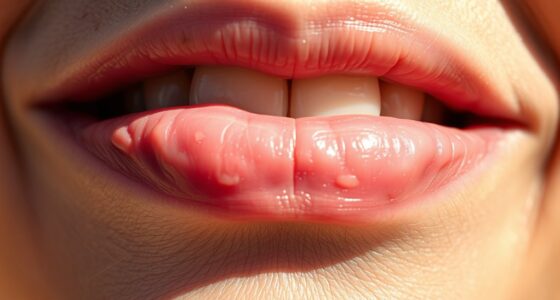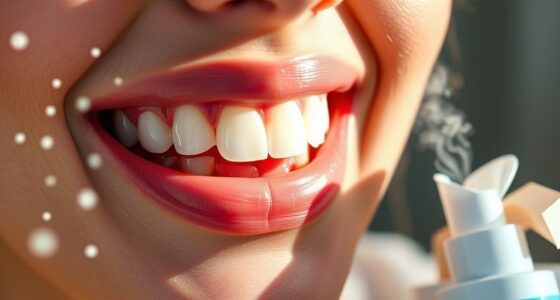Chewing gum isn't just a tasty distraction; it can actually enhance your dental health. When you chew sugar-free gum, it boosts saliva production, which helps wash away food particles and neutralizes harmful acids. This lowers your risk of tooth decay and plaque buildup, protecting your enamel. Plus, gums containing xylitol can inhibit cavity-causing bacteria. Brands like Orbit and Trident, endorsed by the American Dental Association, are great choices. While gum can be a handy addition to your oral care routine, it shouldn't replace regular brushing and flossing. There's much more to discover about keeping those pearly whites healthy!
Key Takeaways
- Chewing sugar-free gum reduces tooth decay by increasing saliva production, which neutralizes harmful acids and washes away food particles.
- Xylitol in sugar-free gum inhibits cavity-causing bacteria and promotes tooth enamel remineralization.
- Gum with the ADA Seal of Approval ensures safety and effectiveness in enhancing oral hygiene routines.
- Chewing gum can combat bad breath by stimulating saliva, which removes food particles and bacteria.
Dental Health Benefits

Did you know that chewing sugar-free gum can actually boost your dental health by reducing tooth decay and plaque buildup? When you chew gum, especially those sweetened with xylitol, you not only enjoy a tasty treat but also promote significant oral health benefits. Increased saliva production occurs as you chew, which helps neutralize harmful acids produced by bacteria in your mouth. This action protects your tooth enamel and contributes to better oral hygiene.
The American Dental Association recommends chewing sugar-free gum as a practical addition to your daily routine. It can help remove food particles and inhibit the growth of cavity-causing bacteria, reducing the risk of gum disease. By stimulating salivary flow, chewing gum can wash away debris and enhance overall cleanliness, making it a valuable tool for maintaining a healthy mouth.
Incorporating gum into your oral care routine doesn't replace brushing and flossing but complements these essential practices. So, next time you reach for a piece of gum, remember that you're not just enjoying a sweet flavor; you're actively supporting your dental health and working towards a brighter smile.
Mechanism of Action

Understanding how chewing gum enhances dental health reveals the fascinating mechanisms behind its effectiveness in promoting oral hygiene. In addition to stimulating saliva production, which helps to wash away food particles and neutralize acids in the mouth, the act of chewing gum also increases the flow of saliva. This helps to strengthen tooth enamel and prevent tooth decay. These surprising benefits of chewing gum make it a convenient and enjoyable way to improve dental health and maintain a clean and healthy mouth.
When you chew gum, it stimulates saliva production, increasing it by up to ten times. This surge in saliva is crucial for neutralizing acids generated by plaque bacteria, helping to maintain a healthy pH balance in your mouth.
As you chew, the increased saliva flow helps wash away food particles and debris that could lead to tooth decay and gum disease. If you choose sugar-free gum, especially those containing xylitol, you're also inhibiting the growth of cavity-causing bacteria, further reducing your risk of cavities.
The act of chewing gum mechanically dislodges plaque and food particles from your teeth, providing a temporary cleaning effect.
Additionally, the saliva generated during chewing contains calcium and phosphate, essential nutrients for strengthening tooth enamel. This process aids in remineralization, considerably lowering the chances of developing cavities.
Recommended Gum Types
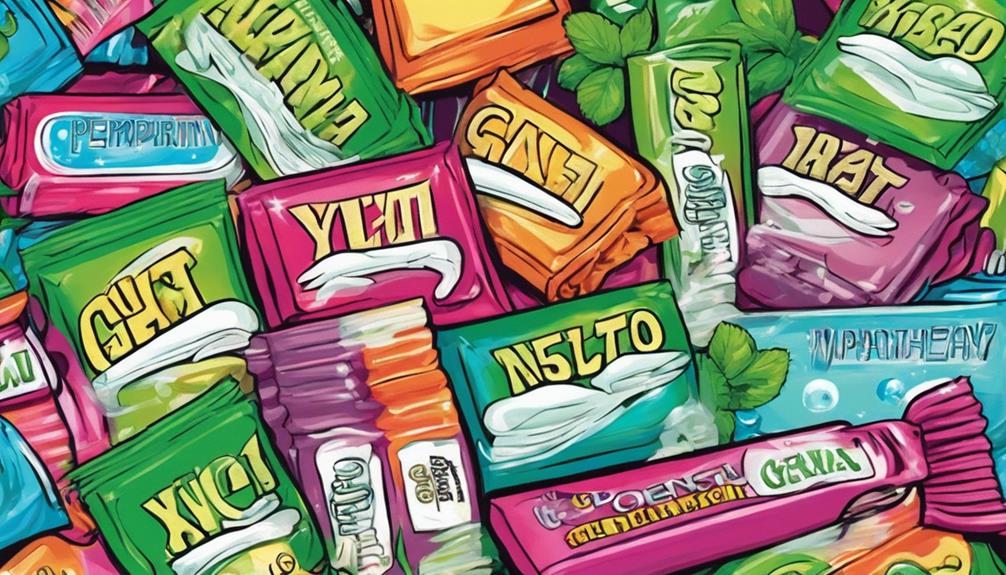
When you're choosing gum for dental health, focus on dentist-approved brands that prioritize sugar-free options.
You'll want to look for those with natural ingredients and sweeteners like xylitol, which can help protect your teeth.
This way, you can enjoy a tasty chew while also caring for your oral health.
Dentist-Approved Brands
Look for three dentist-approved gum brands—Orbit, Extra, and Trident—that not only taste great but also support your dental health. These brands carry the American Dental Association (ADA) Seal of Approval, ensuring they meet safety and efficacy standards. When you choose chewing gum, opt for sugar-free options that help protect your tooth enamel and reduce cavity-causing bacteria.
Here are some key benefits of these dentist-approved brands:
- Xylitol: This natural sweetener helps decrease cavity-causing bacteria in your mouth.
- Oral health benefits: Chewing gum stimulates saliva production, which helps wash away food particles and neutralize acids.
- Ingredient label: Always check the label to avoid harmful ingredients like citric acid that can erode tooth enamel.
Sugar-Free Options
Choosing sugar-free gum is a smart way to boost your dental health while enjoying a tasty treat. The American Dental Association (ADA) recommends sugar-free gum as an effective addition to your oral hygiene routine, especially after meals. These gums, particularly those containing xylitol, help reduce cavity-causing bacteria and prevent tooth decay.
When selecting sugar-free gum, look for options that carry the ADA Seal of Approval. This guarantees the gum is safe and effective for promoting your dental health. Natural sweeteners in sugar-free gums provide a healthier alternative, minimizing the risk of dental issues linked to traditional sugary gums.
However, be cautious about gums that contain citric acid, as this ingredient can erode your tooth enamel and contribute to dental sensitivity and cavities. By opting for sugar-free gum without citric acid, you can enjoy the benefits without the drawbacks.
Incorporating sugar-free gum into your daily routine not only satisfies your sweet tooth but also supports your overall oral hygiene, keeping your smile bright and healthy.
Natural Ingredients
Opt for chewing gums made with natural ingredients like xylitol, which actively support your oral health and help combat cavity-causing bacteria. Choosing the right gum can make a significant difference for your teeth, promoting a healthier smile.
Here are some recommended types of gum to take into account:
- Gum with xylitol: This natural sweetener reduces harmful bacteria and supports dental health.
- Sugar-free options: They help prevent tooth decay and enamel erosion, unlike sugary gums that can lead to dental issues.
- ADA Seal of Approval: Look for gums that carry this seal, ensuring they meet safety and efficacy standards.
Limitations of Chewing Gum
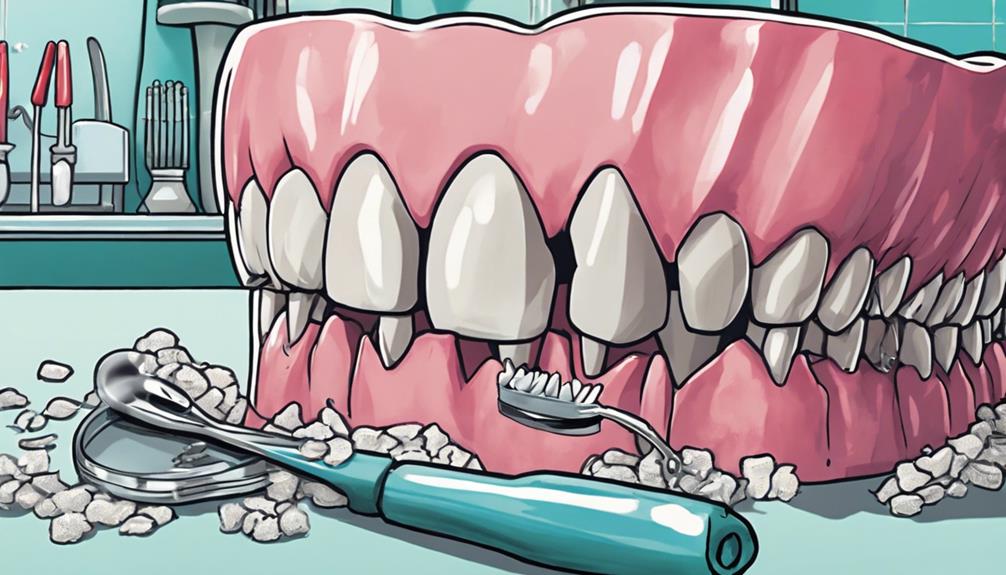
Although chewing gum can offer some benefits for oral health, it has significant limitations that shouldn't be overlooked.
First and foremost, it's not a substitute for brushing and flossing. While gum can freshen your breath temporarily, it doesn't provide the thorough cleaning your teeth need to combat issues like gum disease. Furthermore, excessive gum chewing can lead to jaw discomfort or even temporomandibular joint (TMJ) disorders, so moderation is essential.
If you're opting for gum, be cautious about sugar-sweetened gums, as they can contribute to tooth decay if consumed in excess. It's vital to choose sugar-free options whenever possible. Additionally, if you have dental conditions such as braces or other jaw issues, you should consult your dentist before adding chewing gum to your routine.
Ultimately, while chewing gum can be a fun way to support your oral health, it shouldn't replace regular oral hygiene practices. Make sure you maintain a consistent brushing and flossing routine to keep your teeth and gums healthy.
Routine Dental Care Importance
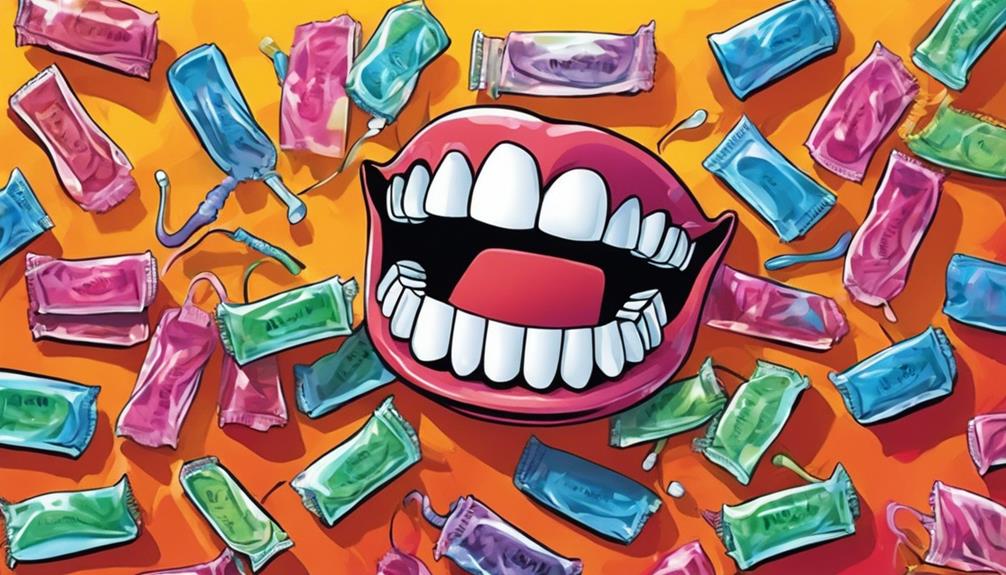
You know that regular dental check-ups are essential for catching problems like cavities before they escalate.
Professional cleanings are necessary to remove plaque that chewing gum can't tackle, ensuring your teeth stay healthy.
Plus, a dentist can create a personalized oral health plan just for you, making sure you get the best care possible.
Regular Check-Ups Essential
Maintaining regular dental check-ups is essential for catching potential issues like cavities and gum disease before they escalate. The American Dental Association recommends you visit your dentist at least twice a year for routine dental exams. These visits reinforce the importance of a consistent oral care regimen and help you stay on track with your oral hygiene practices.
Professional cleanings during these check-ups are critical as they remove plaque and tartar buildup that chewing gum benefits can't address.
Here are some reasons why regular check-ups are important:
- Early detection of dental issues before they worsen.
- Professional cleanings to maintain peak oral health.
- Personalized advice from your dentist on effective oral hygiene practices.
Professional Cleanings Required
Regular dental check-ups not only help catch issues early but also guarantee that professional cleanings effectively remove plaque and tartar that can accumulate despite good oral hygiene practices.
While chewing gum can boost saliva production and assist in plaque removal, it's not a substitute for thorough dental care. Professional cleanings play an essential role in maintaining your overall dental health, as they address buildup that gum alone can't manage.
During your regular dental visits, your dentist not only cleans your teeth but also provides invaluable education on proper oral hygiene techniques. This confirms you're using effective brushing and flossing methods, enhancing your daily routine.
Additionally, dentists offer personalized recommendations for oral care products, including the best types of chewing gum to complement your dental health and even assist with teeth whitening.
Preventive care is critical, as consistent professional attention helps you avoid serious dental conditions. Chewing gum can be a helpful addition to your oral hygiene arsenal, but remember that routine cleanings are important for your long-term dental health.
Make certain you prioritize those regular dental visits for the best outcomes!
Tailored Oral Health Plans
Tailored oral health plans guarantee that your unique dental needs are met, enhancing your overall care and preventing future issues. By focusing on a customized approach, you can ascertain your oral care routine effectively supports your goal of keeping your teeth healthy and beautiful. Here's how a tailored plan can benefit you:
- Regular dental exams and cleanings help catch issues early, ensuring maximum protection against dental problems.
- Good dental hygiene practices you learn from your dentist eliminate acids and bacteria that can lead to decay.
- Chewing gum helps maintain oral health by stimulating saliva, which aids in neutralizing acids and preventing teeth discoloration and gingivitis.
Investing in a customized oral health plan is essential for maintaining your smile. With professional guidance, you'll develop effective habits that promote good dental hygiene and address your individual needs, ensuring that your teeth remain healthy and beautiful for years to come.
Don't underestimate the importance of routine dental care; it's your best defense against potential issues down the line.
Combating Bad Breath
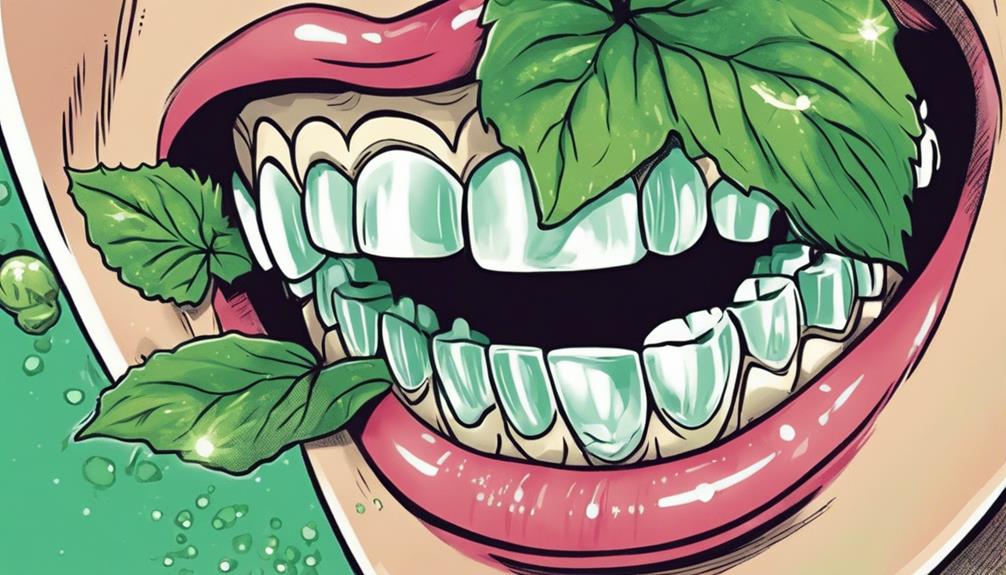
Chewing gum can be a quick and effective way to combat bad breath, especially after indulging in strong-smelling foods like garlic and onions. When you chew sugar-free gum, it stimulates saliva production, which helps wash away food particles and bacteria that contribute to halitosis. The American Dental Association supports this method, highlighting sugar-free gum as a practical solution for temporary relief after meals.
Opting for gum with mint flavoring not only masks unpleasant odors but also provides immediate freshening effects. This can be a lifesaver when you're unable to practice proper oral hygiene, like brushing or flossing.
However, it's important to remember that chewing gum is just a temporary aid. Regular oral hygiene practices remain vital for long-term prevention of bad breath.
Whitening Effects of Gum

Whitening gums can effectively remove surface stains from your teeth and enhance your smile over time. These whitening chewing gums contain special agents designed to tackle common culprits like coffee and red wine. Plus, the mechanical action of chewing gum helps dislodge food particles and plaque, promoting teeth whiteness with consistent use.
Here are some key benefits of incorporating whitening chewing gum into your oral care routine:
- Increased saliva production: Chewing gum stimulates saliva, which helps neutralize acids and wash away staining substances.
- Protective barrier: Some gum varieties create a coating on your teeth, acting as a protective barrier against future discoloration.
- Complementary to treatments: Regular use of whitening gum can enhance the effects of professional whitening treatments, making them even more effective.
Frequently Asked Questions
Does Chewing Gum Make Your Teeth Healthier?
Chewing gum can make your teeth healthier. It stimulates saliva production, helping to neutralize acids, wash away food particles, and reduce cavity-causing bacteria. Just remember, it's best to pair it with regular brushing.
Why Does Chewing Gum Make My Teeth Feel Better?
Did you know chewing gum can increase saliva production by up to 10 times? When you chew, you wash away food particles and neutralize acids, making your teeth feel cleaner and fresher after chewing.
Does Chewing Gum Improve Anything?
Yes, chewing gum can improve oral health by increasing saliva production, which helps neutralize acids and wash away food particles. It can also freshen your breath and reduce plaque buildup when used alongside regular dental care.
What Happens to Your Teeth if You Chew Gum Everyday?
Imagine a rejuvenating waterfall washing away worries; chewing gum daily boosts saliva, helping protect your teeth from decay. It's not a substitute for brushing, but it can enhance your oral hygiene routine considerably.
Can Chewing Gum Contribute to Teeth Whitening?
Looking for the best teeth whitening products at home? While chewing gum can help freshen breath and remove food particles, it does not contribute to teeth whitening. For effective whitening, consider using specially formulated toothpaste or at-home whitening kits. Stay consistent for best results.
Conclusion
Chewing gum can be like a small shield for your teeth, offering protection and benefits you mightn't have considered. It helps fight cavities, freshens breath, and even brightens your smile.
However, remember that it's just one part of your dental care routine. Like a knight needs a sword, your teeth need regular brushing and flossing to stay strong.
So, while gum can be a handy ally, don't forget to give your teeth the full armor they deserve.


